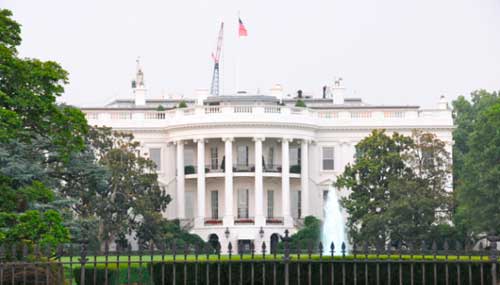 |
|
The White House plans to bring high-speed Internet to 99 percent of all U.S. students. (Credit: Daniel Terdiman/CNET) |
|
Loris Elementary School in Loris, S.C., was ranked 41st in the state in 2011. By 2012, it rose to 19th. What happened? Technology. Many of the students at Loris Elementary School are from low-income families that don't have the means to give their children all of today's high-tech devices, according to the White House. That's why in 2012 the school decided to introduce a technology blended learning program complete with laptops, software, and Internet access. It's apparently made a difference. President Barack Obama is convinced that if all schools worked more technology into their curriculum, they would also excel. That's why he announced on Thursday a new initiative (pdf) to bring high-speed Internet access to 99 percent of all of the country's K-12 students within the next five years. "We are living in a digital age, and to help our students get ahead, we must make sure they have access to cutting-edge technology," Obama said in a statement. "So today, I'm issuing a new challenge for America - one that families, businesses, school districts and the federal government can rally around together - to connect virtually every student in America's classrooms to high-speed broadband Internet within five years, and equip them with the tools to make the most of it." Dubbed ConnectED, the program aims to get all classrooms equipped with Internet access that has speeds of at least 100Mbps and a target goal of 1Gbps. The initiative will also provide teachers with training on how to use more technology in their curriculum. ConnectED plans to especially focus on rural schools where Internet access can be sparse. The majority of schools in the U.S. already have Internet access but it can be extremely slow. According to the White House, fewer than 20 percent of teachers say their school's Internet connections are fast enough to be used sufficiently. No Congressional action is required for ConnectED to go into effect, but the Federal Communications Commission will have to cooperate by leveraging its E-Rate program and provide more discounts to schools on Internet costs. |
據美國科技網站CNET6月7日報道,2011年,南卡羅來納州(South Carolina)洛里斯市(Loris)的洛里斯小學(Loris Elementary School)在全美的排名是第41名,而在2012年,排名升至19。 這是何故?因為科技。 根據白宮的消息,洛里斯小學的許多學生來自低收入家庭,而他們的家庭無法為他們的孩子配備現今的高科技設備。這就是為什么這所學校在2012年決定引進一種技術,能將學習程序與筆記本電腦,軟件和互聯網訪問完整結合。這一技術成效顯著。 美國總統貝拉克·奧巴馬相信,如果所有的學校將更多的科技引入到課堂,它們也將會更加優秀。為此,他在星期四(6月6日)宣布一項新計劃,要在未來五年將高速互聯網普及到美國所有的幼兒園至十二年級的學生群體。 “我們生活在數字化時代,要幫助我們的學生獲得成功,我們就必須確保他們能接觸到先進的技術,”奧巴馬在一份聲明中說道。“因此,今天,我發布美國的一個新挑戰——一個家庭、企業、學校和聯邦政府能夠團結在一起的挑戰——在未來五年內讓幾乎所有的美國學生都能訪問高速寬帶網絡,為他們提供設備,并讓它們得到更好的使用。” 這一計劃被稱為連接教育(ConnnetED),旨在讓所有教室都配備互聯網接口,速度至少100Mbps,目標是達到高潮1Gbps。這個計劃也將為教師們提供培訓,教他們如何在課堂上使用更多的技術。這一教育計劃的落實重點在于網絡稀缺的農村學校。 美國大部分的學校都已可以訪問互聯網,但是網速極其慢。根據白宮的報告,不到20%的教師表示學校的網絡連接速度足夠快,能得到充分利用。 連接教育計劃不需要國會的推準而直接生效,但聯邦通信委員會(Federal Communication Commission)會利用E級計劃(E-rate program)加強合作,并為學校提供更多上網折扣。 (翻譯:溦兮 編輯:Julie) |
